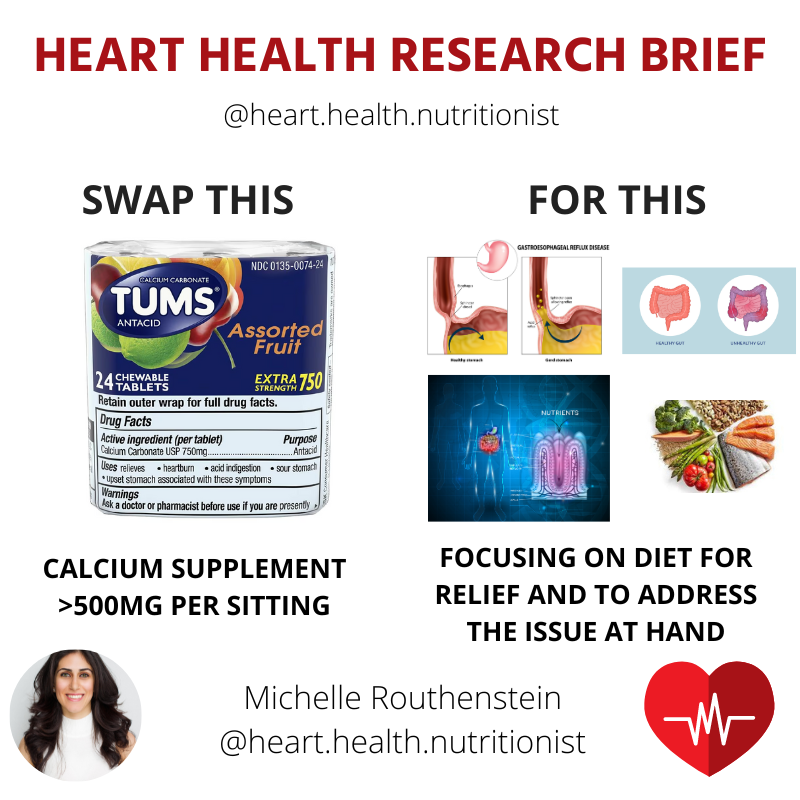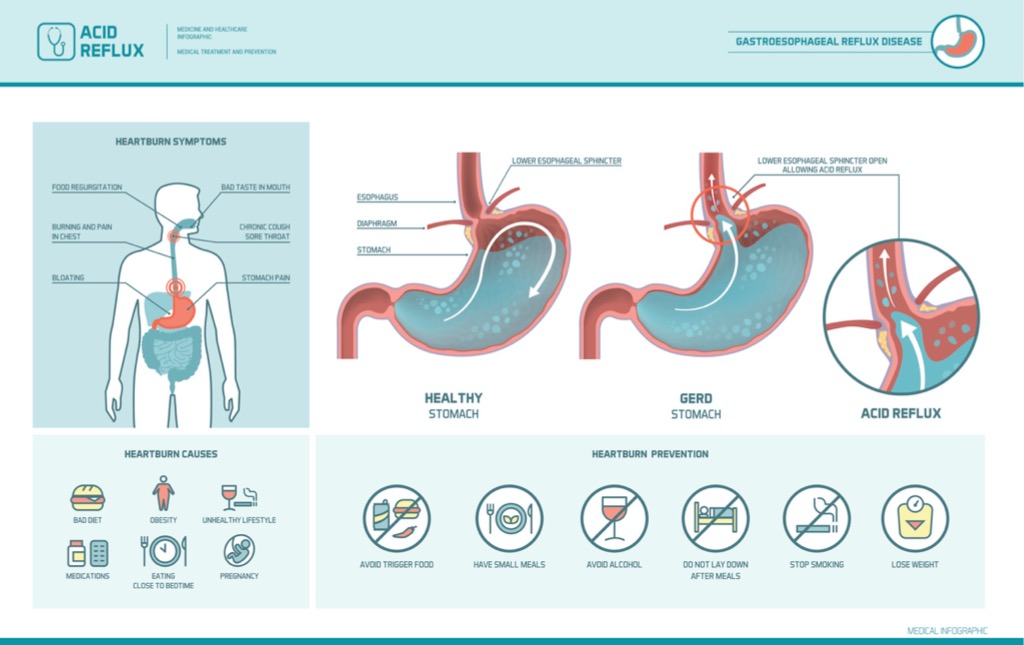Feeling chest pain can be a concerning symptom to experience. Is it simple heartburn, or should you seek medical attention for a heart attack? These two conditions may cause similar symptoms and are connected in some unexpected way, but these conditions are different in their origins and how they are managed.
In this article, you will learn what causes heart attacks and heartburn, what symptoms differentiate a heart attack from heartburn, how heartburn and heart attack may be connected, and the best way to prevent future heart attacks or heartburn.
What is Heartburn?
Heartburn, also known as acid reflux or acid indigestion, is a burning sensation felt in the chest behind the breastbone caused by stomach acid moving back into the esophagus.
What causes heartburn?
Heartburn occurs due to the relaxation of the lower esophageal sphincter (LES) at the wrong time. The LES is located at the point where the esophagus meets the stomach. Its purpose is to protect the esophagus from the acidic contents of the stomach.
A combination of muscle function and neurohormones (hormones produced by nerve cells) control the opening and closing of the sphincter. A malfunction in either of these can result in improper relaxation of the LES or the inability of the LES to fully close. When the LES is unable to close or relax, this allows for the backflow of stomach acid into the esophagus, which then causes the common burning sensation of heartburn.
Who is at risk for heartburn?
While acute heartburn can happen to anyone, there are conditions that can increase the likelihood of getting more frequent heartburn.
Conditions that increase heartburn risk include:
- Pregnancy
- Smoking or inhaling secondhand smoke
- Being overweight or obese
- Hiatal hernias
- Slow gastric emptying
What are the symptoms of heartburn?
Symptoms of heartburn usually occur within the first 30 to 60 minutes after a meal but may start as late as four hours after eating. Once the symptoms begin, they can last for up to two hours.
Common symptoms of heartburn include:
- A painful and burning sensation in the chest behind the breastbone
- Excessive burping
- A sour or bitter taste in the mouth
- Hoarse voice or a sore throat
- Coughing or choking while lying down
- Sleep disturbances
Complications of Heartburn
Heartburn that occurs frequently or consistently may be indicative of gastroesophageal reflux disease (GERD). If left unmanaged, GERD can result in complications such as Barrett esophagus, erosive esophagitis, esophageal strictures, upper gastrointestinal bleeding, and ulcers.
But heartburn can impact more than just the GI tract. A large population study found that GERD significantly increased the risk of a heart attack, with only slight reductions in risks seen in those who were taking medications to manage their acid reflux. This means there is a strong connection between heartburn and heart attacks, but what is the underlying mechanism?
Acid reflux increases the number of pro-inflammatory cytokines within the esophageal mucosa. These cytokines may also circulate throughout the body and contribute to the development of atherosclerotic plaques, a known risk factor for conditions like coronary artery disease, aneurysms, and stroke.
Heartburn also triggers the vagus nerve, which impacts your parasympathetic nervous system. The parasympathetic controls automatic functions such as heart rate, digestion, and breathing.
Overstimulation of the vagus nerve can lead to abnormalities in its function and cause arrhythmia and atrial fibrillation, a drop in blood pressure and heart rate, and coronary artery spasms that can decrease or block blood flow to the heart.
There are several ways that heartburn can negatively impact the heart, therefore it is essential to manage heartburn by addressing the underlying cause.
TUMs, Heartburn, and Heart Health
TUMs, an antacid that contains calcium carbonate are commonly used for managing heartburn. While these over-the-counter medications are okay to use occasionally, they should not be used regularly, as they may be doing silent damage to your arterial health.
Each TUMs tablet has 300-750mg of calcium carbonate depending on the strength. The package typically recommends taking two to four tablets to manage symptoms. However the body cannot utilize more than 500mg of calcium at one time, so it will store the extra calcium in the arteries. This can eventually lead to an increase in calcium deposits in the arteries, a risk factor for cardiovascular disease.

Instead of grabbing a TUMs to treat acid reflux, to protect your heart and your esophagus, it is essential to address the underlying cause of acid reflux. Underlying causes might include motility issues (such as constipation), a weakened esophageal sphincter, or supplements you are taking.
The goal is to improve your acid reflux by addressing your specific issues with science-based personalized nutrition to optimize heart and digestive health, reduce inflammation, and improve nutrient absorption.
Acid Reflux vs Heart Attack: Differences to Look for
Heart attacks are medical emergencies that occur due to a blockage in the flow of oxygenated blood to the heart. Heartburn is an acute or chronic condition that is the result of the LES improperly relaxing and causing stomach acid to backflow into the esophagus.
A heart attack, also known as a myocardial infarction, occurs when the flow of oxygen-rich blood in one or more coronary arteries is reduced or blocked. Two major types of heart attack include ST-segment elevation myocardial infarctions (STEMI) and non-ST segment elevation myocardial infarctions (NSTEMI).
Heart attack symptoms can begin anywhere from a few hours to a few weeks before it happens. Along with chest discomfort and pain, heart attack symptoms include shortness of breath, discomfort from the jaw down to the back, weakness and fatigue, flu-like symptoms, and abnormal heartbeat. If you have any of these symptoms it is essential to seek medical attention as soon as possible.
Acid reflux symptoms are different from heart attacks and usually occur 30 minutes to 2 hours after a meal and are localized to the upper gastrointestinal tract. You may experience a burning sensation in the chest, burping, a sour or bitter taste in the mouth, or coughing and choking while lying down.
While heartburn and heart attacks are quite different conditions, chronic heartburn can be a risk factor for heart disease. Therefore, it is vital to not ignore the symptoms of heartburn as the longer you wait, the worse heart muscle damage it can cause, which can eventually lead to heart disease.
Whether you are at risk of heartburn or a heart attack, you can support a healthy heart by making lifestyle changes and getting regular screenings from your doctor.
Heartburn vs Heart Attack: Scary but Different
Staying informed about your body and how it works is paramount to keeping yourself healthy. Getting guidance on how to most effectively optimize your heart health can have a bigger impact than you may think on your overall health. If you are regularly having heartburn, and it has you worried about how it might be impacting your heart, it is important to work with a cardiac dietitian who can evaluate your lifestyle and help you make positive changes.
My 6-week heart optimization group program can help you understand your heart conditions and learn how to prevent or manage them with diet and lifestyle. If you prefer a more personalized approach, I also offer 1 on 1 services to help reduce your risk of conditions like heart attacks or heart disease through science-based, personalized nutrition.
References
1. Rosen RD, Winters R. Physiology, Lower Esophageal Sphincter. [Updated 2022 Apr 5]. In: StatPearls [Internet]. Treasure Island (FL): StatPearls Publishing; 2022 Jan-. Available from: https://www.ncbi.nlm.nih.gov/books/NBK557452/
2. Argyrou A, Legaki E, Koutserimpas C, et al. Risk factors for gastroesophageal reflux disease and analysis of genetic contributors. World J Clin Cases. 2018;6(8):176-182. doi:10.12998/wjcc.v6.i8.176
3. InformedHealth.org [Internet]. Cologne, Germany: Institute for Quality and Efficiency in Health Care (IQWiG); 2006-. Heartburn and GERD: Overview. 2012 Jul 19 [Updated 2018 Dec 13]. Available from: https://www.ncbi.nlm.nih.gov/books/NBK279254/
4. Young A, Kumar MA, Thota PN. GERD: A practical approach. Cleve Clin J Med. 2020;87(4):223-230. doi:10.3949/ccjm.87a.19114
5. Maruyama, T., Fukata, M., & Akashi, K. (2019). Association of atrial fibrillation and gastroesophageal reflux disease: Natural and therapeutic linkage of the two common diseases. Journal of Arrhythmia, 35(1), 43–51.
6. Lei, W.-Y., Wang, J.-H., Wen, S.-H., Yi, C.-H., Hung, J.-S., Liu, T.-T., Orr, W. C., & Chen, C.-L. (2017). Risk of acute myocardial infarction in patients with gastroesophageal reflux disease: A nationwide population-based study. PloS One, 12(3), e0173899.
7. Reid, I. R., & Bolland, M. J. (2012). Calcium supplements: bad for the heart? Heart , 98(12), 895–896.
8. Gries, J. J., Chen, B., Virani, S. S., Virk, H. U. H., Jneid, H., & Krittanawong, C. (2023). Heartburn’s Hidden Impact: A Narrative Review Exploring Gastroesophageal Reflux Disease (GERD) as a Cardiovascular Disease Risk Factor. Journal of Clinical Medicine Research, 12(23). https://doi.org/10.3390/jcm122374009. Fang J, Luncheon C, Ayala C, Odom E, Loustalot F. Awareness of Heart Attack Symptoms and Response Among Adults – United States, 2008, 2014, and 2017. MMWR Morb Mortal Wkly Rep. 2019;68(5):101-106. Published 2019 Feb 8. doi:10.15585/mmwr.mm6805a2
